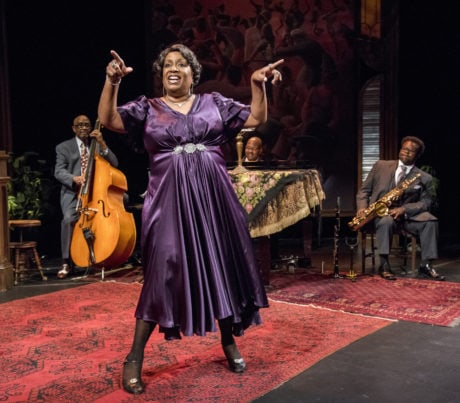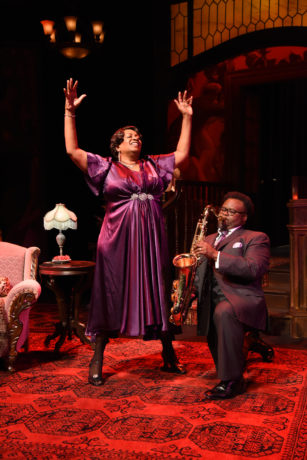In what is surely the most badass, take-no-prisoners performance by a musical artist on a DC stage in recent memory, Miche Braden brings her sensational star turn as Bessie Smith to H Street, belting out the blues and setting the house afire with heartbreak and deliverance.
The show is The Devil’s Music: The Life and Blues of Bessie Smith (so-called because in the 1920s the blues were considered unholy, unlike church music). It’s a spectacular kickoff to Mosaic Theater Company’s third season.

The setup of the show (conceived and directed by Joe Brancato, written by Angelo Parra) is that Smith and her musicians (Jim Hankins on bass, Anthony E. Nelson Jr. on sax, Gerard Gibbs on piano) have come to play a black night club because the white owner of the club where they had been booked made them use the back door. Smith told the cracker: if I can’t enter by the front door I’m not appearing on your stage—and quit the gig. What’s brilliant about this premise is not only that it immediately gives don’t-mess-with-me gravitas to Smith’s character—about which we learn more later. It also immediately casts the audience as habitues of that boîte (here gorgeously designed in reds, lavenders, and amber by Brian Prather and lushly lit by Todd O. Wren). Thus we are performed to as if we are presumed to be on Smith’s side from the get-go. As if we are more than sympathetic strangers. As if we are black.
I love when a work of theater literally creates who its audience is, when it addresses us in a way that unites us in a shared identity with common concerns, even if unfamiliar heretofore. The way this shift happens in The Devil’s Music is at once sly, beautiful, and subversive. And the dynamo in this dynamic is the phenomenal singer and actor Miche Braden. As soon as she enters singing “There’ll Be a Hot Time in the Old Town Tonight,” she begins coaching and coaxing the audience to respond as the brothers and sisters she assumes us to be. She shares Smith’s stories and point of view not as though we are interlopers who would not understand but as if she has welcomed us to her world because she knows we’re the folks who’ll get her. And it is that insider knowingness—wonderfully present in Braden’s earthy laughter, gutsy candor, scathing wit, and brassy moves—that, even more than the song lyrics and vocal styling, brings Bessie back as rebel.
To listen today to Bessie Smith records is to miss this quality. No matter how well digitally remastered, Smith’s recorded voice sounds toned down, constrained in sameness, without the audio amplitude our ears now associate with emotional range. We have to infer that range from the storytelling lyrics because it’s technically not there to hear. By contrast, Braden’s deep powerhouse voice in live performance makes amply resonant all the hurt, fury, and longing in the songs. And as a concert experience alone, The Devil’s Music is a knockout. (Braden also did the musical arrangements, which are stunning.)

But there’s much more going on than a concert. “I’m a big girl but I’m light on my feet,” she says at one point, then deftly does a dance that delightfully legitimises being a woman of size. Audaciously and unselfconsciously, Braden embodies a full-figured bodily freedom and fully conscious female integrity that vividly underpin the story points in the narrative—including what was for Smith’s time an unconventional sexual appetite for both men and women, and including Smith’s instantaneous defiance against the woman hate of men in her life and the race hate of the Klan.
What begins as a premise that we the audience are all in attendance at a black club becomes gradually emblematic of one wounded but proud black woman’s liberation—recognizable, relatable, rageful, and righteous.
The transformative force of Miche Braden’s performance in The Devil’s Music: The Life and Blues of Bessie Smith is a profoundly important experience. Don’t miss it. She’ll get you getting it.
Running Time: 85 minutes, with no intermission.
The Devil’s Music: The Life and Blues of Bessie Smith plays through September 24, 2017, with a possible extension through October 1, 2017, at Mosaic Theater Company of DC performing in the Lang Theater at Atlas Performing Arts Center – 1333 H Street NE, in Washington, D.C. For tickets, call the box office at (202) 399-7993 ext. 2, or purchase them online.




